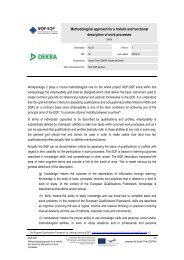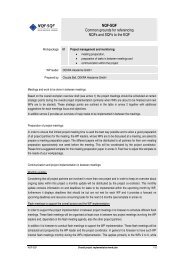Overview of National Qualification frameworks - Project-Nqf-Sqf
Overview of National Qualification frameworks - Project-Nqf-Sqf
Overview of National Qualification frameworks - Project-Nqf-Sqf
Create successful ePaper yourself
Turn your PDF publications into a flip-book with our unique Google optimized e-Paper software.
__Planning and effective achievement <strong>of</strong> expected learning outcomes;__Results monitoring;__Internal evaluation <strong>of</strong> results;__External evaluation <strong>of</strong> results;__Continuing improvement <strong>of</strong> results in education.A <strong>National</strong> Group for Quality Assurance was created to promote and develop specific instruments for qualityassurance in vocational education and training (VET); GNAC intends to support the application at national level <strong>of</strong>the European Common Quality Assurance Framework in VET - CQAF. GNAC includes representatives <strong>of</strong> ARACIP,NCTVETD, NATB as well as <strong>of</strong> the two ministries involved in education and training policies: MERI and MLFPSwhich intend to adopt a national quality assurance framework.__Planning and effective achievement <strong>of</strong> expected learning outcomes;__Results monitoring;__Internal evaluation <strong>of</strong> results;__External evaluation <strong>of</strong> results;Continuing improvement <strong>of</strong> results in education.A <strong>National</strong> Group for Quality Assurance was created to promote and develop specific instruments for qualityassurance in vocational education and training (VET); GNAC intends to support the application at national level <strong>of</strong>the European Common Quality Assurance Framework in VET - CQAF. GNAC includes representatives <strong>of</strong> ARACIP,NCTVETD, NATB as well as <strong>of</strong> the two ministries involved in education and training policies: MERI and MLFPSwhich intend to adopt a national quality assurance framework.Speaking about Malta, the level rating <strong>of</strong> qualifications to the MQF is considered as a quality assurancemechanism. Only foreign qualifications which are mutually recognised can be incorporated in a protocol whereforeign awarding bodies are represented in Malta. Home-grown qualifications must satisfy number <strong>of</strong> standardsby filling in a standard application form which includes the learning outcomes and has to be approved by MQC andby an independent evaluator representing a Designated Authority or an academic/pr<strong>of</strong>essional expert if no suchauthority exists.When a protocol is signed between MQC and the public or private education and training providers the level ratedqualifications are listed in the Malta Register <strong>of</strong> Regulated <strong>Qualification</strong>s which is available on the MQC website.This Register shall eventually evolve into a Database with the learning outcomes and details <strong>of</strong> all regulatedqualifications.The level <strong>of</strong> difficulty <strong>of</strong> any home-grown qualification is confirmed after consulting the EQF and MQF leveldescriptors.In the Netherlands the process <strong>of</strong> referencing is carefully planned. It started with an advise how to develop andimplement EQF in the Netherlands, including the pitfalls and the problem areas. This advise is the basis <strong>of</strong> thedevelopment, which started with the development <strong>of</strong> the conceptual framework. Experts from the educationalsectors participated in the development <strong>of</strong> the conceptual framework. Consultation rounds and the possibility tocomment on the draft are planned to avoid mislinkings. After the setting <strong>of</strong> the NLQF a <strong>National</strong> Coordination Pointwill be responsible for the scaling <strong>of</strong> qualifications.The <strong>National</strong> Table/Committee in Italy revealed the need <strong>of</strong> involve a Quality Reference Point to avoid mislinkingsbetween the NQF and the EQF and for the link with the EU guidelines, but nothing has been yet developed.In Germany it is to early to answer this question – no activites are going on in this fields at the momentThe levels <strong>of</strong> the formal qualifications <strong>of</strong> the DQR are consistent with the EQF. This means you cannot refer atraining course in Volleyball to level 5 (this was an example showed by Malta) But as descriptors are hermeneuticcategories the whole referencing process can not be proved (validated) in terms <strong>of</strong> validity and reliablity.In France the RNCP takes into account very carefully the quality <strong>of</strong> the process for construction <strong>of</strong> the certificationand The methodology for drawing up vocational certifications and external analysis by outside organizationsconstitute the quality criteria for the register."This project has been funded with support from theNQF-SQF:European Commission. This publication reflects the views40/41only <strong>of</strong> the author, and the Commission cannot be held<strong>Overview</strong> <strong>of</strong> <strong>National</strong> <strong>Qualification</strong>responsible for any use which may be made <strong>of</strong> theprepared by 3s research laboratoryinformation contained therein."<strong>frameworks</strong>




